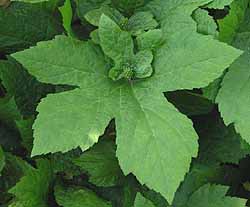 Goldenseal
Goldenseal
Hydrastis Canadensis L. (Ranunculaceae)
Common Names
Goldenseal, eyebalm, eyebright, eyeroot, goldenroot, ground
raspberry, hydrastis, Indiana dye, Indian paint, Indian plant, Indian turmeric,
jaundice root, Ohio curcuma, orange root, turmeric, wild turmeric, yellow
eyewright, yellow paintroot, yellow puccoon, yellowroot, yellowwort.
Description
Goldenseal is a North American woodland herb with a yellow
perennial rhizome. A new stem grows each year about 30 cm high. The leaves are large
(up to 30 cm wide), usually with five lobes but can have up to 7. A single white flower, a mass of stamens
with no petals, is produced from late April to May, depending on latitude and altitude,
followed in July by a bright red berry with 10 to 30 black seeds. The fruit looks
like a raspberry but is inedible. The natural range of
the plant extends from southern New England west through the extreme southwestern
portion of southern Ontario, to southern Wisconsin, and south to Arkansas and northern
Georgia.
Goldenseal is highly valued for its rhizome and roots that contain medicinal alkaloids. The roots have antibiotic properties, suppressing certain bacteria, protozoans, and fungi, and are used to treat AIDS and other severe chronic diseases, and digestive disorders, and to enhance the immune system. Commercial formulations prepared from the plant are widely used to treat colds and nasal congestion, as well as certain infections and parasites.
Flowering Period
April to May
Range
Vermont to Georgia, west to Minnesota and Arkansas
Habitat
Rich woods.
Harvest
Rootstock in fall; leaves or tops in late summer or fall, after
seeds ripen.
Duration
Perennial
Family
Buttercup
Uses
The pulverized rhizomes and roots have been used a long time to treat mouth
ulcers, and as a hemostatic. This preparation has also been used as a
diuretic in catarrhal conditions, and as an astringent for treating certain eye
conditions. In Appalachia, a root tea is used as a tonic.
Native American medicinal uses of the root included treatment of the eyes and skin and for cancers and venereal diseases. The yellow root provided dye. This plant should be avoided during pregnancy.